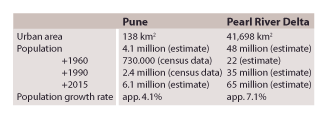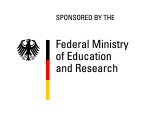Objectives
This project aims at providing applied solutions for sustained water and health systems as essential components of the quality of life and housing in Chinese and Indian megacities. Designed as a trilateral research partnership of Chinese, German and Indian partners, the regional focus is on two outstanding “hot spots” of economic development and megaurbanisation in China (Pearl River-Delta) and India (Pune as part of the Mumbai-Pune urban corridor). By its trilateral approach, the project will contribute to a better understanding of urban governance processes in megacities and to the identification of appropriate new solutions.
 In
China and India, megacities have grown to an unprecedented size and the
pace of urbanisation has far exceeded the growth of necessary infrastructures
and services. Despite reforms, healthful-city movements and many improvements
in recent years, the inha-bitants are confronted with water-related and
environmental health risks, limiting the quality of life and well-being
substantially. Additionally, increasing social inequalities and fragmentation
lead - as in many megacities worldwide - to significant intra-urban (water
and energy) supply shortages and huge health inequalities, indicating increasing
disadvantages for the megaurban population.
In
China and India, megacities have grown to an unprecedented size and the
pace of urbanisation has far exceeded the growth of necessary infrastructures
and services. Despite reforms, healthful-city movements and many improvements
in recent years, the inha-bitants are confronted with water-related and
environmental health risks, limiting the quality of life and well-being
substantially. Additionally, increasing social inequalities and fragmentation
lead - as in many megacities worldwide - to significant intra-urban (water
and energy) supply shortages and huge health inequalities, indicating increasing
disadvantages for the megaurban population.
Major, strongly interconnected fields of the project are
-
Securing of sustainable (1) water, (2) health and (3) housing, and development and implementation of efficient (4) governance and steering mechanisms.
Guiding principles
Planning as well as implementation will be transdisciplinary and participative, with multidimensional analyses of dynamic, process-oriented approaches (decision support systems), actor-/action-oriented components, long-term perspectives, and flow models. The approach will be integrating the human dimension into the hitherto mainly physical aspects of man-environment science, and will include early warning systems and modern problem-solving techniques.
Equal participation of all stakeholders is crucial; a strong interaction of science, education and applied work is important to assure efficient capacity building. The participation of strong partners is important for the successful cooperation and research in the project. Our partners are outstanding with excellent reputation, and we are basing on several years of reliable cooperation experience.
Expected results
The project aims at jointly developing, testing and implementing comprehensive decision support solutions and concepts to support efficient governance and steering mechanisms for securing sustainable water supply, public health and quality of life/housing. Additional existing links to scientific and governmental partners in Delhi and Beijing will ensure dissemination of project results beyond the individual cases within Chinese and Indian megacities. The foundation of national centres of megacity research in Guangzhou and Delhi/Pune is envisaged.
Project Organisation
The work packages are structured around the four major themes identified above and include aspects of a) health advantages and disadvantages for living in mega-urban regions, b) urban structures, processes, density and inter-connections, c) environmental and land-use dynamics and d) interrelationships, chances and frictions between traditional and modern urban culture.
During the ongoing Phase I (two-year preliminary phase), the established partnerships with all participants have been further formalised and widened; programmes for research and implementation are currently in process of specialization. During workshops in China, India and Germany, the needs of the Chinese and Indian partners are being identified, the joint working procedures are being developed and the collaboration intended for the main funding period are being prepared. Pilot studies to test the different research approaches and joint teaching and research activities combined with student exchanges support the strengthening of the trilateral research partnership.
During Phase II (main funding period), the consortium will work on the different work packages as defined and conceptualised in Phase I. These work packages will contain a multitude of components. In order to ensure flexibility to include the major issues of the relevant stakeholders, the finalisation will take place during the progress of Phase I.
